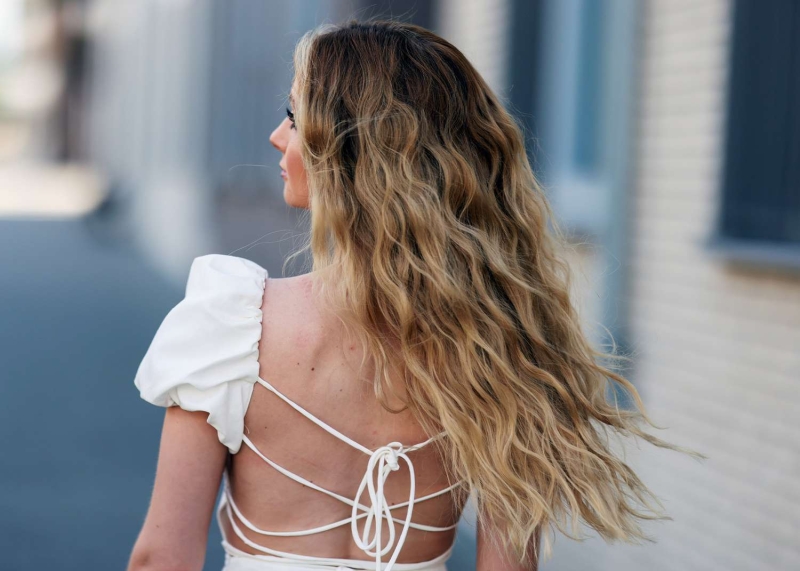Contents

If you can't seem to keep your hair looking and feeling soft, shiny, and healthy regardless of how much you try, almond oil may be the missing link. When applied to hair that needs extra hydration, this unique oil can provide a wide range of benefits thanks to its extensive nutritional properties.
From calming sensitive scalp concerns to reviving dry, brittle strands for natural shine and strength, experts agree that almond oil has it all. However, some specific intel is important to know when incorporating this ingredient powerhouse into your hair-care routine because there are some hair—and skin—types that it doesn’t work for.
Meet the expert
- Adam Federico is a hairstylist and vice president of technical education at R+Co.
- Robert Finney, MD is a assistant clinical professor of dermatology at Mount Sinai in NYC and founder of Soho Skin and Hair Restoration.
- Gretchen Friese is a hairstylist and trichologist for BosleyMD.
Here, we went straight to top hair pros to find out everything there is to know about almond oil for hair. Read on to see if almond oil is the simple, natural ingredient that you wish you started using way before now. Plus, discover the best pro-approved products that will make your at-home hair-care routine super easy and mess-free.
What Is Almond Oil?

“Almond oil is a superfood for hair,” says Federico. “It’s lightweight, quick-absorbing, and contains a powerful blend of vitamins E, A, and D, plus important minerals magnesium and calcium as well as omega 6 and 9 fatty acids, helping to deliver deep nourishment and hydration.”
Dr. Finney agrees and adds that almond oil, like other lightweight oils from plant and botanical sources, can help soothe dry, brittle hair. “It has antioxidant properties to help reduce inflammation and oxidative stress,” he says. When used in hair-care (and skin-care!) product formulations, it may also be listed as sweet almond oil on the label.
Benefits of Almond Oil for Hair
According to Friese, almond oil's superpowers for hair include " protecting against UV damage, repairing damaged hair, taming frizz, and adding shine.” Although you can whip up a DIY almond oil treatment at home, Friese points out that it’s a common ingredient in various hair products, including serums, oils, treatment masks, and leave-ins. As such, it may be both less messy and more cost-efficient to purchase almond oil-laced products instead.
However, if DIY is your preference, she recommends putting raw almonds in a food processor or blender and processing them until they turn into a fine powder. “The almonds should release their natural oils during the grinding process, which will create a paste-like consistency before it's applied to your hair,” she says. Also, mixing various other natural oils with almond oil can help maximize its effectiveness. “Almond oil can also be combined with other oils like cedarwood oil to reap the benefits of both,” she adds. While dry, damaged hair can benefit most from almond oil, it can also potentially help soothe sensitive scalp conditions as well because of it’s hydrating and soothing properties.
How to Use Almond Oil for Hair

Essentially, experts say to simply work almond oil into your hair routine by using any product you find it in. “Because almond oil can help to nourish and protect as well as add softness and shine, I like almond oil as an all-around ingredient,” says Federico. When using a pure almond oil product, Dr. Finney suggests smoothing it directly onto damp hair or scalp. “This will help it seal in the most moisture,” he says.
If you are specifically targeting your scalp, Friese says that almond oil should be used directly on the areas of concern. “If you have dandruff or an itchy scalp, applying almond oil directly to your scalp may help reduce inflammation and flakes and soothe the itch,” she explains. If your goal is to treat and smooth down unruly, dry, or frayed ends, she says to put a pea-sized amount of pure almond oil directly on the ends of dry hair. “This will help hydrate and decrease frizziness,” she says. However, you can also use it as an allover hydration boost, too. “As a general hair treatment, apply it to your scalp and gently massage your hair or comb it from the roots to the tips to evenly distribute the oil,” she adds.
Products That Contain Almond Oil
When to Avoid Almond Oil for Hair
Federico explains that you should not leave pure almond oil treatments on your hair and scalp pre-heat styling, especially if you are planning to hit high temperatures. “Pure almond oil can be problematic when styling as it can heat the hair and scalp, potentially causing damage,” he says. “I like almond oil when blended into products with other ingredients, particularly those that provide thermal protection.” Also, if you suffer from any nut allergy, you should avoid using almond oil, just like you would steer clear of other nut-based oils. “Also, acne-prone skin may want to avoid applying almond oil directly to the scalp because it may block pores and cause pimples and breakouts,” he adds.
Frequently Asked Questions
- How long can you leave almond oil in your hair?
“Leave it on for 20 or more minutes or even overnight if desired,” says Friese.
- Does almond oil help with hair loss?
Experts say that it’s possible but not one hundred percent. More research is needed to prove that almond oil is effective at promoting hair growth. However there is some data that suggests that it can. “There was one study that showed that applying almond oil directly to the scalp helped reverse hair loss,” Friese explains. “This is most likely because of the anti-inflammatory and antioxidant properties.”
Dr. Finney adds that although it’s not a proven hair loss treatment precisely, the benefits it does have can help you keep the hair you have stay healthier. “Almond oil can reduce breakage in damaged hair cuticles from over processing,” he says.
- Which is better: almond oil or coconut oil for hair?
The answer: almond oil. “Coconut oil doesn’t contain the same vital nutrients that almond oil does, so while it’s definitely good for the hair, I wouldn’t label it a superfood,” says Federico.
- Should you put hair oil on wet or dry hair?
“You can do both—it just depends on the purpose of the oil,” says Friese. “If you’re looking for heat protection from a blow dryer or UV protection on air-dried hair, then put it on wet hair, but for any other purposes, it can go on either wet or dry hair.” If you have finer hair or don’t like it when there’s too much oil to wash out, apply it to dry hair. “Applying any hair oil to dry hair gives you more control and a truer idea of how much you are using,” says Friese. “It’s possible to apply too much of a product to wet hair.”

